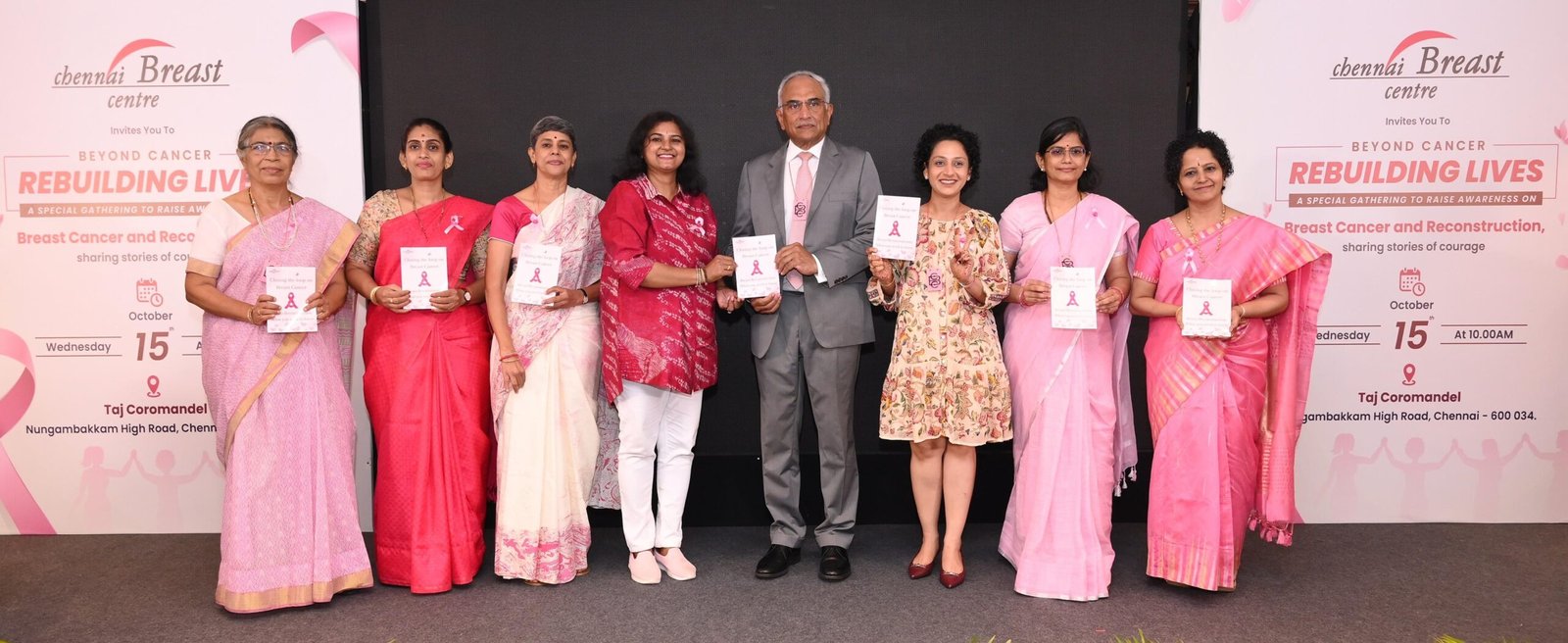Chennai, October 15, 2025: In a powerful celebration of resilience and hope, Chennai Breast Centre organised ‘Beyond Breast Cancer: Rebuilding Lives’, a special gathering of over 100 breast cancer survivors from across Tamil Nadu, most of whom have undergone reconstruction, to raise awareness about breast cancer and reconstruction on World Breast Reconstruction Day 2025.
Dr. Venkat Ramakrishnan, Senior Consultant, Plastic & Reconstructive Surgeon of Chennai Breast Centre, and Dr. Selvi Radhakrishna, Senior Consultant Oncoplastic Breast Surgeon, participated in the event that featured survivors sharing their personal journeys and experiences, along with video presentations on breast cancer and reconstruction.
Breast reconstruction is a surgical procedure to restore the shape of a breast after a mastectomy (removal of the entire breast), using implants or the patient’s own fat from the abdomen, back, or thighs. World Breast Reconstruction Day, also known as BRA Day, is observed on October 15 to raise awareness about reconstruction’s role in recovery, educating patients and healthcare providers on available options, benefits, and its emotional impact.
Breast cancer is the most commonly diagnosed cancer among women in India, accounting for nearly 30% of all female cancers, with 192,020 new cases reported in 2022. Over 60% of these cases are detected only at Stage 3 or 4, when mastectomy often becomes necessary. However, breast reconstruction after mastectomy remains rare in India, with only about 1% of women undergoing the procedure, often due to cultural perceptions or financial constraints. In contrast, over 65% of women in Europe opt for reconstruction. The need for awareness is particularly urgent in India, where breast cancer often occurs a decade earlier – in women’s 40s and 50s – and losing a breast can profoundly affect self-image and confidence, which reconstruction can help restore.
The way forward is to integrate breast reconstruction with cancer treatment, ensuring women receive comprehensive care from diagnosis to recovery. This requires developing more skilled professionals through focused training for oncosurgeons and reconstructive specialists. Equally important is insurance recognition of reconstruction as a medical procedure, not an aesthetic one. Further, the establishment of one-stop centres offering diagnosis, surgery, reconstruction, and rehabilitation will make treatment accessible and affordable.
In her comments, Dr. Selvi Radhakrishna said, “Improved medical facilities and accurate imaging have made earlier detection possible, allowing many women to survive longer and lead productive lives. In the West, women recommended mastectomy are routinely offered immediate reconstruction, but in India, this is often omitted. As a result, many survivors live with disfigurement, psychological distress, and loss of confidence—highlighting the urgent need to integrate reconstruction into cancer care.”
In his comments, Dr. Venkat Ramakrishnan said, “Breast reconstruction techniques have advanced tremendously. Microsurgical reconstruction, performed at the same time as breast removal using the patient’s own tissue – often tummy fat – adds only about two hours to surgery and has a success rate of over 99% when done by experienced surgeons. It is extremely safe, and provides a natural breast that ages with the patient. In some cases, mastectomy and breast reconstruction can also reduce the need for post-surgery radiotherapy. Using abdominal tissue also removes excess fat, which can benefit overall health. With greater awareness of these advantages, more women can make informed choices and embrace reconstruction as a vital step toward complete recovery.”




